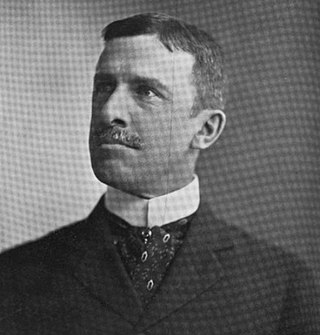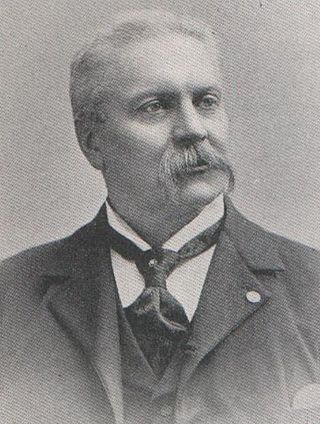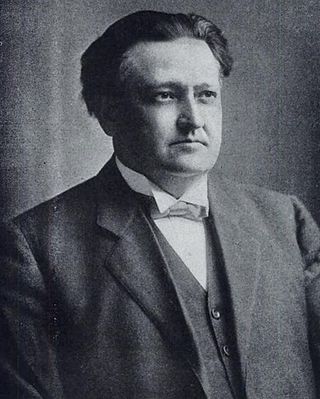
Jonathan Hunt was an American lawyer and politician from Vermont. He was a member of the United States House of Representatives for the state of Vermont and was a member of the prominent Hunt family of Vermont.

Jonathan Arnold was an American physician and statesman from New England. He was born in Gloucester, Rhode Island, served in the Continental Army as a surgeon, and directed the army hospital in Providence. He represented Rhode Island as a delegate to the Confederation Congress in 1782 and 1783. He moved to a farm in St. Johnsbury, Vermont in 1787, and later served as a judge.
James Elliot was an American soldier, lawyer, author and politician. A holder of local and state offices throughout his life, he was most notable for his service as a United States representative from Vermont.

Lawrence Brainerd was an American businessman, abolitionist and United States Senator from Vermont. A longtime anti-slavery activist, after leaving the Jacksonians in the 1830s, Brainerd was active in the Whig, Liberty, and Free Soil parties, and was one of the organizers of the Republican Party when it was formed as the main anti-slavery party in the mid-1850s. Brainerd's longtime commitment to the cause of abolition was recognized in 1854, when opponents of slavery in the Vermont General Assembly chose him to fill a five-month vacancy in the United States Senate.

William Upham was an American attorney and politician from Montpelier, Vermont. He was most notable for his service as a United States senator from Vermont.

Edward Curtis Smith was an American attorney, businessman, and politician from Vermont. A Republican, he was most notable for his service as the 47th governor of Vermont from 1898 to 1900.

Frederick Holbrook was an American farmer, businessman, and Governor of the State of Vermont. Active in politics and government, first as a Whig, and later as a Republican, he was most notable for his service as the 27th governor of Vermont from 1861 to 1863.

James Manning Tyler was an American politician, lawyer and judge from Vermont. He served as a U.S. Representative from Vermont for two terms from 1879 to 1883.

Kittredge Haskins was a Vermont lawyer and Republican politician. A Union Army veteran of the American Civil War, he served in the United States House of Representatives from 1901 to 1909.

Harland Bradley Howe was a United States district judge of the United States District Court for the District of Vermont.

Hoyt Henry Wheeler was an associate justice of the Vermont Supreme Court and later a United States district judge of the United States District Court for the District of Vermont.

Levi Underwood was a lawyer and politician from Vermont. Originally a Democrat, Underwood's antislavery views caused him to join the new Republican Party when it was founded. Underwood was most notable for his service as the 23rd lieutenant governor of Vermont from 1860 to 1862.
Micah Townsend was an attorney and political leader in Revolutionary War-era Vermont. The offices he served in included Secretary of State of Vermont.

John Holbrook was a publisher and entrepreneur. An early settler of Brattleboro, Vermont, Holbrook was notable for initiating a publishing industry there.

Eleazer Lee Waterman was a Vermont attorney, politician and judge. He was most notable for his service as a judge of the Vermont Superior Court (1906-1919) and as the court's chief judge (1917-1919).
Charles Chapin was a physician and public official from Brattleboro, Vermont. Among the offices in which he served were member of the Vermont House of Representatives (1833-1834) and United States Marshal for the District of Vermont (1853–1857).

Stephen Ambrose Walker was an American lawyer from New York. He was most prominent for his service as United States Attorney for the Southern District of New York from 1886 to 1889.

Green Mount Cemetery is a burial ground in Montpelier, Vermont. Located at 250 State Street, the 35-acre facility was established in 1854. It is operated by the City of Montpelier, and managed by the city's part time cemetery commission and a small full-time staff.

Charles N. Davenport was an American attorney, businessman, and political candidate from Vermont. A Democrat during the American Civil War and post-war era when Republicans won every election for statewide office, Davenport was an unsuccessful candidate for offices including governor and U.S. representative. He was a delegate to many local, state, and county Democratic conventions, and was the founder of the Brattleboro Reformer newspaper.
















